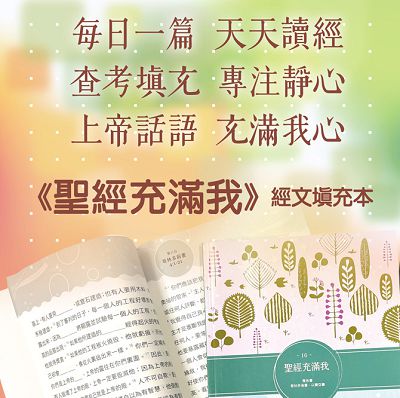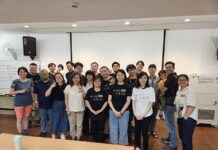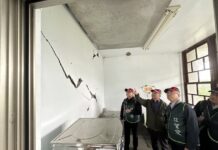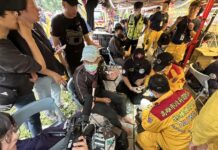May 21-27, 2012
Headline News
Protests against Ma administration reach new heights in intensity and originality on inauguration week
Reported by Simon Lin, Chiou Kuo-rong, and Lin Yi-ying
Written by Lydia Ma
Tens of thousands of protesters flooded the streets of Taipei on May 19, 2012, one day before President Ma’s inauguration for a second term in office. They came out to protest Ma’s support for lifting the ban on U.S. beef containing the food additive ractopamine, raising utility prices, levying of capital gains tax on securities transactions. Members of the DPP and TSU parties, along with members from other non-governmental organizations, led this mass rally and protesters used many means to voice their displeasure and demand reforms and apologies from the Ma administration.
On the other side of the country, people who were not able to join protesters in Taipei for various reasons held an anti-Ma protest at Kaohsiung Central Park. At this rally, hundreds of people braved the heavy rain to protest against the President. They denounced the President for fooling them to get their votes before the election and then stealing their money once he had been re-elected into office.
To prepare for this inauguration ceremony and ward off protesters, Ma had cordoned off an area of 27 square kilometers around the Presidential Palace and dispatched more than 1,000 police officers. Renowned Taiwan Southern Express President Chiou Kuo-chen observed that this was the largest controlled area that had ever been put in place in Taiwan and criticized President Ma for locking himself away and avoiding protesters.
Han Ming-jung, an elder at Chengchung Presbyterian Church located in Kaohsiung and former President of Taiwan Society, said that since Ma Ying-jeou was elected by the people, he should have placed people’s concerns first. However, Ma went back on his promises as soon as he was reelected and compromised Taiwan’s sovereignty for the sake of pleasing Beijing – an odious regime that is hated even its own people.
Han added that Christian principles based on God’s righteousness would not tolerate Ma’s corrupt regime that favored select corporations at the expense of the common people, as evidenced by the exorbitant “Dreamers” production (which is still under investigation), and the increase in utility prices shortly after Ma’s re-election.
Public discontent rose on the day of the inauguration as the President’s inaugural address failed to include any apology for mismanaging the affairs of the state. Instead of issuing an apology, Ma brought up the infamous “One country, two areas” idea once again. His statement was later heavily criticized by former President Lee Teng-hui as a gross distortion of history and an irresponsible act. The DPP, TSU, and PFP are allegedly considering the possibility of joining forces to vote out the new cabinet.
Artists use rock music to protest against Ma
Besides various anti-Ma rallies, a rock concert denouncing President Ma and his “one country, two areas” proposal was held on May 18 in Taipei’s Zhongzheng District on Qingdao East Road, near the Taipei Train Station. This event co-sponsored by Taiwan Society and the PCT provided a platform for disgruntled people to voice their anger.
That a China-leaning president would be re-elected into office shows that there is a severe lack of self-recognition and self-identification with one’s own country, observed Taiwan Society President Wu Shu-min when interviewed by Taiwan Church News.
PCT Associate General Secretary Kho Sing-doh was invited to offer a prayer during the concert. He prayed that God would give Taiwanese people strength and courage to impeach President Ma. In response to those who may think that pastors ought not make any public statements concerning politics, especially a statement calling for the impeachment of a president, he clarified that all pastors have a political stand. He underscored that, in the Bible, even Jesus and God had made a point to stand by marginalized people such as orphans, widows, and oppressed people.
Kho added that Jesus was crucified precisely because he was not on the same side as the pious religious authorities whose only concerns were their own vested interests. If churches today are indeed the body of Christ, they would and heed the suffering of the people in Taiwan and the land as well. “For this reason, pastors have taken sides – because Jesus takes sides and God takes sides!”
“Top 10 Social Issues” list reveals troubling pattern of foreign intervention
Taiwan Democracy Platform, an organization consisting mainly of scholars, published a list of 10 social issues or incidents representative of the development of democracy in Taiwan that took place during the first term of President Ma’s administration.
This report first collected key incidents that took place between May 20, 2011 and April 15, 2012. A total of 63 major events were deemed to have affected Taiwan’s democratic progress and these were later reduced to 10. Of these 10 issues, 5 of them were found to be heavily influenced by foreign countries such as the US or China, whose intervention greatly impacted the course and outcome of these issues.
Commenting of President’s Ma’s seeming cluelessness to the people’s dissatisfactions, the organization’s convener, Chu Hai-yuan, said that it was very disturbing that Beijing may be more clued in to Taiwanese people’s thoughts and dissatisfactions than the Ma administration.
The 10 issues published by Taiwan Democracy Platform are the following:
1. The Lin family’s forced eviction and the Urban Renewal Act
2. The sale of China Times to Want-Want Holdings and boycott of China Times
3. Foreign intervention in Taiwanese elections
4. Lifting of the ban on U.S. beef containing ractopamine
5. Journalists report that the Bureau of Animal and Plant Health Inspection and Quarantine had covered up cases involving bird flu during the election campaign
6. More than 500 judges sign petitions demanding reform of the Supreme Court
7. Invasive marketing strategies in media news programs
8. Tsai Ing-wen becomes the first female presidential candidate
9. President Ma proposes “One country, two areas” and a peace treaty with China
10. Tao indigenous groups oppose nuclear energy
“The two greatest evil powers in Taiwan are a rotten government and a rotten media!” said Chu Hai-yuan. He underscored that Taiwan’s economic competitiveness was weakened by Ma’s pro-China policies such as the Economic Cooperation Framework Agreement, while Taiwan’s sovereignty was compromised by rhetoric such as the “1992 Consensus” and the “One country, two areas”. Furthermore, when intervention from business corporations that have vested interests in China is added to the list, it is not difficult to understand why there has been mass dissatisfaction with the Ma administration.






